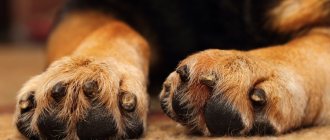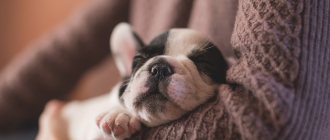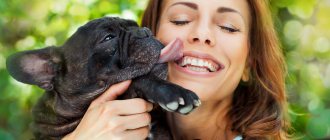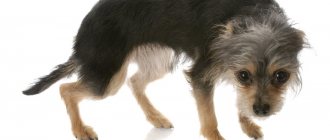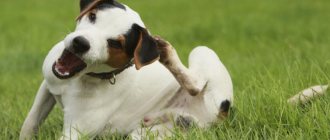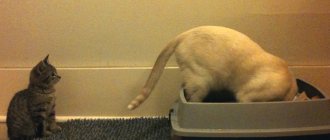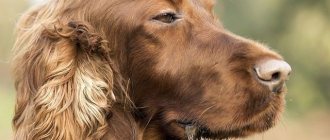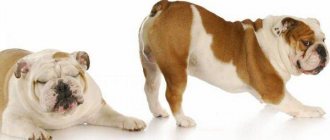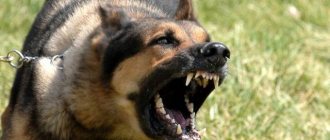Why does a dog eat its own poop?
If the dog has tried feces once and no longer shows interest in it, then there is no reason to worry. By studying other people's feces, dogs find out details of interest for themselves. For example, what gender is the animal and is there sexual hunting? The temperature of the stool determines how long ago the owner left it.
You should worry if, in addition to sniffing, there is regular eating of “heaps”. Neutered males and females are especially susceptible to this addiction. It is necessary to find out the reason for this behavior in order to wean the dog from eating its own or other people's excrement.
- Normal curiosity. Puppies, like little children, strive to taste everything. In this way, they discover the environment and its inhabitants.
- Hunger. When an animal experiences severe hunger, everything that can somehow replace food and fill the stomach is used.
- Imitation of mother. Babies up to one month old are cared for by the mother, eating “heaps” of them. Growing up, some kids copy her actions.
- Concealing traces of the “crime”. The puppy may remember the punishment for “piling” in the wrong place and tries to destroy the “evidence”.
- Memory of ancestors. A dog is a domesticated wolf. In the natural environment, young or weakened individuals destroy their feces to hide their tracks from a stronger enemy.
- Serious problems in the gastrointestinal tract. The pet is not able to say that it hurts and ask for help. Symptoms of the disease often become visible when the disease has already dealt a heavy blow to the body. Causes for concern should include flatulence, difficulty bowel movements, nausea, vomiting, and abdominal pain. In this case, by eating feces, the animal is trying to help itself.
- Gastronomic preferences. It's hard to believe, but sometimes your pet eats its own feces because it likes the taste and smell.
- Yearning. Even people sometimes do stupid things out of boredom. Likewise, dogs look for something to do if they are locked up for a short time. Why not eat your own stool?
- Lack of owner's attention. Sometimes dog owners do not have enough time to communicate sufficiently with their pet. By eating its feces, the pet tries to attract the attention of the owner. Even his swearing is taken for additional attention.
A reason that can disrupt a dog’s emotional balance can be nervous shock:
- moving;
- long journey by car;
- prolonged absence of the owner;
- physical punishment;
- performance at a competition or exhibition.
Possible consequences
We figured out why a dog can eat its own feces. You should also know that coprophagia is not actually considered a disease, but rather is classified as simply a nuisance or destructive behavior. In principle, “fragrant heaps” cannot cause significant harm to your pet, but only if we are talking about his own waste products and at the same time your dog is completely healthy.
It should be remembered that, having tried it once and not receiving a ban from the owner, the dog will definitely perform a similar action again and again. And this is already fraught with consequences.
What can enter a dog’s body with feces (even if the dog is supposedly healthy):
- Worms and other parasites . These organisms will slowly “eat” your pet from the inside, harming his well-being, mood, and health. In addition, do not forget that animal worms are transmitted to humans.
- Hazardous substances . For example, those contained in the soil (if this action occurred on the street) or in the floor covering.
- Infections . E. coli, viruses and microorganisms can cause serious health problems for your pet.
Consolidation of the habit of eating your own feces occurs if a person reacts to a problem at the wrong time or incorrectly.
What are the reasons why a dog eats cat feces or excretions of other animals?
At the level of instinct of distant ancestors, pets eat other people's feces to improve digestion. Replenishment of missing vitamins and microelements occurs through bird droppings, human excrement or cat feces.
The manure of herbivores contains large amounts of protein and fiber. Horse feces help get rid of worms. Perhaps coprophagia is caused by improper feeding:
- Fatty, salty foods.
- The predominance of cereals in the diet.
- Exclusively meat diet.
- Excessive feeding and bloating.
- Cheap unbalanced feed.
- Unhealthy foods such as sweets.
One of the reasons may be submission to authority figures. By eating “heaps” of stronger animals, the weaker ones thus show respect and submission. This can happen if there are several dogs in the house.
Animals often mark their territory with feces. Perhaps, by eating feces in the cat's litter box, the dog seeks to destroy traces of its opponent. Or he is afraid of the owner’s anger and cleans up the tracks of a careless cat in some corner.
Sometimes an animal eats someone else's feces in an attempt to get rid of worms. In this case, gastronomic attention can also be attracted by earth, sand, coal and other inedible substances.
Why is coprophagia dangerous?
Do you use no commands when your dog eats feces?
Yes
86.44%
No
13.56%
When a dog eats its own excrement or cat feces, it is not in danger. Provided that the cat is domestic, and both animals are wormed and vaccinated. But if your pet picks up other people’s feces on the street, infection is possible:
- worms;
- parvovirus enteritis is a dangerous infection that leads to death in puppies up to 5 months;
- leptospirosis - canine “jaundice”, the virus affects the capillaries, muscles, liver, kidneys, mortality reaches 50-80%;
- toxoplasmosis - manifested by high fever, lethargy, refusal to eat, digestive tract upset, purulent discharge from the nose and eyes.
All diseases that dogs contract from the excrement of other animals are transmitted to humans.
How dangerous is such a habit?
Regularly eating feces risks contracting serious diseases:
- Intestinal parasites. Helminths lead to digestive problems and metabolic disorders. When there is a large accumulation of worms, the intestines become blocked and subsequently rupture. This leads to the death of the dog.
- Parvovirus enteritis. A deadly viral infection that mostly affects adolescents.
- Leptospirosis. In common parlance – jaundice. The main impact falls on the animal's liver. The disease is severe and rapid, especially in puppies and older dogs. Death can occur within 12-24 hours of infection.
- Toxoplasmosis. An infection that is transmitted not only to animals, but also to humans. Elderly individuals are more susceptible to the disease. Due to weakened immunity, treatment may not be effective.
Why is the habit of eating poop dangerous?
The dog pees on the bed: why and how to stop it
If your pet starts eating feces, you shouldn’t turn a blind eye to it, thinking that it will go away over time. In addition to the fact that such pet behavior looks simply disgusting, it can also lead to serious consequences. Dog and human feces are a by-product of vital activity, which means they contain many pathogenic microorganisms, wastes and toxins. Eating feces can lead to the following complications:
- helminth infection. Even simple worms, if they are not removed from the body in a timely manner, can cause serious damage to health, even death. A large number of parasites leads to clogging of internal organs, which after some time can provoke their rupture;
- parvovirus infection. This severe, fatal disease primarily affects young dogs;
- jaundice (leptospirosis) - liver damage. Young dogs have a hard time with jaundice; if timely measures are not taken, death occurs 12 hours after infection.
Important! A dog's habit of picking up feces can lead to toxoplasmosis. This disease is dangerous because it causes damage to health, can lead to death, and can be transmitted from pet to person.
Feces contain many pathogens that cause serious illness.
How to stop a dog from eating feces?
First, it is recommended to consult a veterinarian to rule out health problems. Coprophagia can be not just a bad habit, but a cause of internal disorders of the body.
Carry out the necessary blood, urine, and stool tests for the presence of worms and do an ultrasound. Only after ruling out possible diseases can you begin to try to get rid of this addiction.
Possible paths and actions:
- Consult with a specialist - why the dog eats feces, what is missing in its diet. Monotonous food, cheap ready-made food is not the best nutrition option. A proper menu with added vitamins will help correct the situation. Sulfur and B vitamins must be present. Add meat and bone meal or buy premium ready-made food. It is beneficial to feed unpeeled beef tripe. It is rich in enzymes useful for digestion.
- Give your pet more attention if eating stool is an attempt to attract him. While walking, try to actively play, run, and talk with your pet.
- Give a piece of your favorite treat after every bowel movement outside. After a week or two, replace the treat with praise or distract the attention with a favorite toy.
- During the period of treatment or change of menu, wear a muzzle when walking. Just make sure that the dog can breathe freely in it. This will automatically prevent you from eating the excrement.
- Don't shout or punish for a bad habit. This will not solve the problem, but will only make it worse. The pet will continue to eat feces, only on the sly. It is important to teach him not to do this, and not force him.
- Learn the “Fu” and “Don’t” commands. Having noticed the animal’s interest in the next “bunch”, lightly pull the leash and say “Fu”. If there is no leash, shout the command loudly, come closer and distract him by playing with his favorite toy. Be sure to praise your dog for his obedience. If an unpleasant moment occurs and you do not have time to stop eating excrement, do not hug the animal or allow it to come close to your face.
- You shouldn’t be punished for “heaps” and “puddles” made in the apartment. Physical punishment is completely ineffective and useless in this case. Poking your puppy into your feces can cause confusion and loss of smell. For fear of being punished, the pet will begin to destroy traces of the “crime” by eating them.
- If puppies become curious about their excrement, try to clean it up immediately after defecation. Thus, you will deprive them of the opportunity to follow the example of a mother caring for babies.
- Treating dog feces with garlic sauce, horseradish, mustard (Russian) or hot pepper. Add the seasoning to the stool and let your dog eat it. This method takes away your appetite for such a delicacy for a long time.
- Experts suggest using food additives that make feces smell disgusting even to the pet itself. Veterinary pharmacies sell anti-coprophagia medications.
- You can take professional help and contact a dog trainer. He will teach the dog not to pick up anything on the street.
Video: why does a dog eat its own feces, and how to stop it from doing so?
Causes
There are logical reasons why a dog eats its own poop. In science, eating one's own or other people's excrement is called coprophagia. Oddly enough, this is one of the most common problems associated with dogs.
Did you know? In the world, almost 20% of four-legged friends do this all the time, and more than 80% have been seen eating “sweets” at least once. Conventionally, the reasons can be divided into historical, psychological and physiological. Let's look at all these groups in more detail.
Historical
Genetic memory often manifests itself in dogs, causing them to follow ancient instincts.
- All dogs are former predators, moreover, many most likely come from those who did not disdain carrion and spoiled rotten meat. Many wild animals eat feces. For example, predators do not disdain the feces of herbivores, because it contains many substances that are beneficial to them.
- Mothers lick the droppings of their pups to eliminate the odor, which can attract predators and males, and because of the enzymes it contains. By the way, this is precisely why eating poop is more common in females than in males.
- The consistency of feces resembles the first food that puppies received from their mother when she returned from hunting. She regurgitated the food and fed the puppies with this.
Psychological
- Many dogs remember what their mother did and copy her behavior . Responsible breeders try to prevent this from happening, but, unfortunately, this is not always possible.
- The habit of eating one's own excrement is formed when trying to hide traces of a crime (piles on the floor) during puppyhood. This is primarily due to the inadequate, angry reaction of the owner himself. If the puppy has been scolded too much or even beaten for making piles, then the only way to avoid punishment, in the puppy's opinion, is to destroy the evidence. He can only remove it in one way.
- To attract attention . Dogs may become bored and lack communication with their owner or lack of activity. Four-legged animals see the solution to the problem in attracting the owner’s attention with some kind of dirty trick, that is, destructive behavior.
- Fighting for territory with other animals can lead to constant psychological stress for the dog, which can also result in destructive behavior (including eating its own feces).
Physiological
- As trivial as it may seem, most often a dog eats its own feces when it is simply hungry. This is especially true for puppies during the period of active growth, when it is very difficult to calculate the dose of food.
- Poor quality food can cause your dog to lack vitamin K, B vitamins, proteins and/or minerals. This can also push the dog onto the “criminal” path.
- Lack of enzymes for puppies is a very pressing problem. By eating its feces, the puppy replenishes lost enzymes and normalizes its intestinal microflora.
- The presence of worms can also trigger an attack of coprophagia.
Actionable recommendations
Let's summarize and note the main points in the fight against coprophagia:
- Contact your veterinarian and have him examined for possible internal problems of the body.
- Introduce variety into your diet. Add healthy vitamin supplements and minerals.
- Show attention and tolerance to your pet. His mood and state of mind completely depend on you.
- If your dog spends a long time alone, provide him with a variety of toys.
- Teach the “Fu” and “No” commands.
- Distract from the discovered “goal” with games.
- Reward your pet after each bowel movement with a treat and praise.
- Clean up your pet's excrement in a timely manner so that he does not have time to show interest in it.
- If there are several animals in the house, give the dog a little more attention. Don't give reasons for jealousy.
- Contact a professional trainer.
When faced with the problem of eating feces, the main thing is to correctly identify its source. Screaming and swearing will not bring results. Conduct a health examination, and only then get down to education.
Be patient and analyze the behavior of your four-legged friend. Perhaps the reason is quite simple and is on the surface. Follow the recommendations offered by experts, and everything will work out for you.
Contacting a veterinarian
If within 1-2 weeks there is no positive result in weaning your pet from eating feces, you need to contact a veterinarian. Perhaps the factors that provoke the emergence of unusual gastronomic addictions are much more serious than it seemed.
If your puppy eats feces, do not immediately panic and take drastic measures. Perhaps this is a method of getting to know the outside world. You need to watch the pet for some time, and only if the dog grows up, but does not change its habit, you need to help it with this. If an adult is addicted to eating feces, this is a reason for immediate action.


